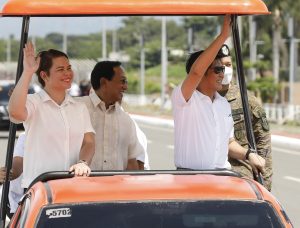The quick answer to the question posed in the title of this article is no. They are criticizing members of Congress and even Philippine President Ferdinand “Bongbong” Marcos Jr., but their party is still part of the ruling coalition.
The Duterte political dynasty is led by former President Rodrigo Duterte, who “retired” after the end of his term in June 2022. His daughter is Vice President Sara Duterte, who is concurrently the secretary of the Department of Education. His eldest son is a congressman while another son is mayor of Davao City.
The Dutertes from the south (Davao) allied with the Marcoses from the north (Ilocos) and formed a unity team in the 2022 election and managed to achieve a landslide victory. They agreed that after six years, the Marcoses would support the presidential bid of Duterte’s daughter.
But since the second half of 2023, cracks have begun to form in this seemingly formidable partnership. Sara Duterte resigned as leader of her political party, condemning the “political toxicity” and “execrable political powerplay” that allegedly undermined her mandate.
During the budget deliberations, the opposition questioned her use of confidential funds, since her agency is not directly involved with intelligence and national security matters. It was also exposed that in December 2022, she allegedly spent 125 million pesos of her confidential funds in just 11 days.
Responding to public clamor, the leadership of the House of Representatives made a collective decision to remove the confidential funds of civilian agencies, which included the Education Department.
This angered the Duterte patriarch who came out of “retirement” and criticized Congress as the country’s “most rotten institution.” He singled out House Speaker Martin Romualdez, who is a first cousin of Marcos, and challenged him to have the funds of Congress audited. He said that Romualdez is aspiring to become president in 2028
In November, Duterte was sued by an opposition lawmaker for making “grave threats” in his TV program. A government broadcasting regulator also suspended Duterte’s TV program for airing profane language. Duterte and his supporters decried this action as a violation of freedom of expression, which is ironic since the former president has been accused of intimidating journalists. In fact, he supported and applauded the Congress decision to revoke the franchise of the country’s largest media broadcaster.
The Dutertes have become more outspoken in lambasting the Marcos government over the past month. They all released statements enjoining the people to reject the charter change proposal spearheaded by members of Congress. Interestingly, the Dutertes endorsed charter change in the past when they advocated federalism. Analysts believe that amending the Constitution could derail the presidential candidacy of Sara Duterte especially if the form of government is changed and term limits are removed.
Duterte, the congressman, claimed that there is corruption in the approval of government projects. Duterte, the mayor, publicly called for the resignation of Marcos as president. Duterte, the former president, accused Marcos of being a drug addict and dared him to undergo drug testing. He also reminded the police and military to take action and protect the Constitution.
The elder Duterte added that the secession of Mindanao island could be an option, as he accused Marcos of plotting the charter change campaign. Davao is located in Mindanao. Duterte was the first president from Mindanao, which has Muslim and Moro-dominated provinces. For almost four decades, a Mindanao-based armed self-determination movement challenged the government until a peace agreement was signed and implemented during the term of Duterte.
Duterte’s idea of secession was widely put down by Mindanao leaders and various government agencies. Some officials even suggested that Duterte could be liable for sedition or incitement to sedition.
The rift between the Marcoses and the Dutertes appears to be widening and this could continue to disrupt local alliances until the midterm 2025 elections or even before that period if charter change will be actively pursued in the coming months.
From decrying corruption to exposing the misplaced priorities of charter change proponents, the Dutertes have been pointing out the excesses and misdeeds of the Marcos government. Could they lead the opposition bloc? Unfortunately, they lack the credibility to represent themselves as a genuine opposition force against the Marcos-led government.
Activists insist that the elder Duterte has self-serving motives in attacking Marcos. Aside from advancing the presidential candidacy of his daughter, he is seeking to escape accountability for the corruption and abuses committed under his administration. His supporters are afraid that he could be arrested by the International Criminal Court for his role in the bloody “war on drugs.”
Despite the war of words between the president and her father, Sara Duterte has refused to resign her Cabinet post. She also noted that her brother’s call for the resignation of Marcos may be motivated by “brotherly love” for the attacks hurled against her. In other words, the Dutertes are maneuvering for greater influence without severing ties with the ruling coalition.
If the split becomes irreconcilable, the Dutertes are expected to mobilize their local constituents and loyal allies; but they will get no support from activists, human rights defenders, independent media, and opposition politicians, all of whom were viciously persecuted during the previous government.

































